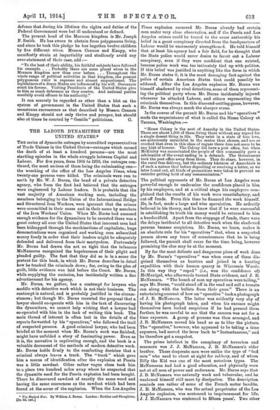THE MORMONS.*
Ix is somewhat difficult for those who, in the language of the Latter-Day Saints, are called "Gentiles" to treat Mormonism seriously. To them the founder of the Mormon creed appears to be either an impostor or a lunatic, and the creed itself a farrago of nonsense devised to cloak immorality. Messrs. Bland and Backhouse, however, in their recent interesting work on the Court of Peking, have warned us that, if we wish to understand the Chinese, it is above all things necessary to detach ourselves from all Western modes of thought and standards of action. Notably, they urge that it is impossible for anyone who regards polygamy as a form of "immorality" to study Chinese history with intelligent sympathy. The same remark holds good about Mormoniam, but with this qualifi- cation, that the more the intelligence is enlightened by a knowledge of the facto, the more is anything approaching to sympathy dispelled. The facts, however, are from several points of view worthy of study. They show how impos. Bible it is to fathom the depths of human credulity. They
..gham rirall9 and his Kormon_Empire. By'Frank Cannon and. Georg* L. Knapp. Lonslon: Fleming H. Revell Company. [6a. net.]
constitute a singular instance of the impotence of a highly civilized society to deal effectively with the growth of a movement which cuts at the root of some of the most funda- mental principles on which its own civilization rests. It is certainly a strange by-product of modern progress that a half-crazy impostor, followed by a resolute, self-seeking adventurer, should have been able to brave the public opinion, the Legislature, and even at one time the armed forces, of a highly civilized and powerful community such as that existing in the United States of America; that they should have suc- ceeded in establishing a form of government tainted with the worst features of a cruel and despotic theocracy in the heart of a Republic; that the principles of tho Mormons, which outrage every canon of decency and of morality, both public and private, although abrogated in appearance, should still be maintained in fact; and that no fewer than some four hundred thousand individuals should now be adherents of the Mormon faith. In spite, therefore, of the abundant literature which already exists on Mormonism, the book written by Messrs. Cannon and Knapp may be read with interest and instruction. The title which they have chosen—Brigham Young and his Mormon Empire—at once arrests attention, inasmuch as it brings prominently into view the striking political anomaly involved in the existence, not of an Imperium in Imperio, but of an Imperium in Republica.
Most people who have given any attention to this subject know that in the year 1830 an inhabitant of the State of New York, named Joseph Smith, who was wholly illiterate and subject to epileptic fits, published the Book of Mormon, which he alleged to be a translation of an ancient scripture, revealed to him by an angel, and written in a lost language on golden plates. The origin of this imposture was indicated in 1813 by Mr. Henry Caswell, Professor of Divinity at Kemper College, Missouri. Professor Caswell stated that a certain Solomon Spaulding, who was born in Connecticut in 1761, wrote an historical romance entitled The Manuscript Found, based on the idea, with which he was possessed, that the aborigines of America were descended from some of the tribes of Israel. He died in 1816. His manuscript passed into the hands of his widow, who remarried. How the authors of the Book of Mormon became subsequently possessed of it is not quite clear. It is certain, however, that all the historical portions of Joseph Smith's work, which purported to be a revelation, are merely a transcript from Spaulding's original romance.
Smith's first and most important revelation was quickly followed by others. For instance, one revelation told him that be need not be in any hurry to pay his bills; another directed his followers to lend him money, and prescribed when and where be was to pay it back ; a third ordered a convert to sell a tannery and hand the proceeds of the sale over to the Mormon Church. It may well be asked how it came about that a religion based on such manifest self-interest and imposture took root and was accepted by thousands of more or less educated people. The explanation is supplied by the special social conditions existing amongst the community to whom Smith preached. Professor Caswell quotes a remarkable forecast made by the poet Southey a year or more before Smith issued his Book of Mormon. "Were there another Mohammed to arise," Southey wrote, 'there is no part of the world where he would find more scope, or fairer opportunity, than in that part of the Anglo-American Union into which the elder States continually discharge the restless part of their population, leaving Laws and Gospel to overtake it if they can ; for in the march of modern colonization both are left behind." This prediction was speedily fulfilled. The mass of the population of the Mississippi Valley had been almost wholly neglected by the hierarchies of the Christian Churches. Hence they "were religious without having an organized religion ; they were hungry for spiritual guidance without knowing how to get it." They therefore turned eagerly to the numerous sects—Disciples of Christ, Cumberland Presby- terians, Hicksite Quakers, Millerites, and others—which sprang up on all sides. Amidst this schismatic chaos, Mormonism arose and readily found a hearing. Many also joined the Mormon ranks for utilitarian rather than for spiritual reasons. They welcomed the protection against the outside world which the powerful Mormon organization was calculated to afford. "They were Sainte by day and horse. thieve, by night," Messrs. Cannon and Knapp think that if Mormonism had been treated with kindly indulgence, or with the contempt which it certainly deserved, the theocracy would have died a natural death without any further efforts on the part of the community. As, however, invariably happens, persecution gave strength to the Mormon cause, and the brutal murder of the dreamy visionary, Joseph Smith, by a Missouri mob placed the control of the movement in the hands of "a grimly practical captain with despotic temper and a will of flint." Brigham Young, his biographers state, was "one of the moat remarkable men ever born on the Western Continent." The ambiguous epithet "remarkable" may, in fact, very fitly be applied to this rough, coarse-minded, but singularly able despot. His career excites the interest which the world always bestows on any display of undaunted courage, fixity of purpose, and indomitable will. But in no other respect does he excite the least admiration. The story of Brigham Young's relations with the other sex is disgusting. Be married some half-a-dozen or more of Joseph Smith's widows, and denounced the prophet's first wife, Emma, who abhorred polygamy, as "the damnedest liar that ever lived." His methods of government were barbarous. He relentlessly per- secuted, and even encouraged the murder of, those who in any way resisted his authority. He was responsible for inciting the Indians to massacre a party of half-starved immigrants at Mountain Meadows, and he allowed a ruffian named Lee, who was the principal agent in this ghastly act, to remain for years a Bishop of his Church. Under the pretence of disposing of property for the benefit of the whole community, he amassed a huge private fortune. "Long before his death there had ceased to be any definite line between the properties which Brigham held for himself and those which he held for God Almighty; and in such cases of uncertainty he usually gave himself the benefit of the doubt." Whatever may be thought of the morality of the methods which be adopted, it cannot be denied that they were eminently successful. The "Lion of the Lord" possessed a Napoleonic power of organizing and an amount of shrewd common-sense which formed a good substi- tute for statesmanship. He was wise enough to see that it was better and cheaper to feed the Indians than to fight them. He saw clearly enough the evils which the rush for gold in California was likely to produce, and he discouraged his followers from taking part in it. When he was invited to oppose the extension of the Union Pacific Railroad westward, he expressed his views in characteristically vigorous language, "Damn a religion," he said, "that can't stand one railroad." His sermons to his flock consisted largely of exhortations to build fences, clear out irrigation canals, and devote their attention to the quality of the bulls and rams from which their stock was bred. He only once, and then reluctantly, indulged in a "revelation." The greater part of this curious document reads like the general order of a commander about to embark on a campaign, although at the close a certain amount of Biblical cant was added by his more zealous associates in order to satisfy the spiritual aspirations of his followers. He clamoured for admission to the Union, and at the same time administered to his adherents an oath pledging them to undying hostility towards the Government of the United States. War was declared against him. It ended in the "unmitigated humiliation of the Federal Government, and in almost unmixed triumph for the Mormon kingdom." A. legal crusade undertaken against him met with no better success. So early as 1853 he said: "I am and will be governor, and no power can hinder it, until the Lord Almighty says Brigham, you need not be governor any longer." He successfully asserted this principle to the day of his death. Messrs. Cannon and Knapp sum up his career in the following words :- "Brigham Young had passed a thousand dangers. He had been threatened by an army and prosecuted by the law. For more than twenty years the mass of the people in the United States had expected to see him imprisoned or executed as a traitor. And he died at a good old age in his bed, surrounded by a worshipping court in the capital of an empire which he had built and which he maintained to the hour of his death in the heart of a Republic."
In considering this strange history it is difficult to say which excites more astonishment—the impudence of the rebel, or the supineness and inefficiency of the executive Government which tolerated his proceedings. The greatest sinner appears to have been President Buchanan, but it may be urged in his defence that during his lifetime the rights and duties of the Federal Government were but ill understood or defined.
The present head of the Mormon kingdom is Mr. Joseph F. Smith. He has sworn to abstain from polygamous living, and since he took this pledge he has begotten twelve children by five different wives. Messrs. Cannon and Knapp, who manifestly strain at impartiality and studiously avoid any over-statement of their case, add :—
" To the best of their ability, his faithful subjects have followed his example.. . . Probably there are more plural wives in the Mormon kingdom now than ever before. . . . Throughout the whole range of political activities in that kingdom, the present polygamous ruler is supreme and almost unquestioned. The legislatures of a dozen States are influenced by his will. Governors court his favour. Visiting Presidents of the United States give to him as much deference as they receive. And national parties carefully avoid offence to his authority."
It can scarcely be regarded as other than a blot on the system of government in the United States that such a monstrous excrescence as that described by Messrs. Cannon and Knapp should not only thrive and prosper, but should
also at times be courted by "Gentile" politicians. 0.








































 Previous page
Previous page